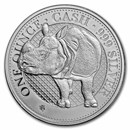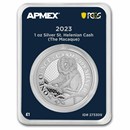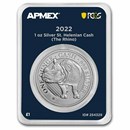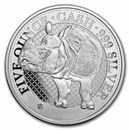Cash India Wildlife Silver Coins

| Quantity | Check/Wire |
|---|---|
| 1 - 18 | $35.13 |
| 19 - 99 | $34.63 |
| 100 + | $34.13 |

| Quantity | Check/Wire |
|---|---|
| 1 - 18 | $35.63 |
| 19 - 99 | $35.13 |
| 100 + | $34.63 |
CASH India Wildlife Series Silver Coins
The Treasures of India Wildlife Series is an APMEXclusive® collection that celebrates the significance of India's diverse fauna. This series features stunning coins crafted from 1 oz and 5 oz of .999 fine silver, showcasing the country's most iconic animals. Among these creatures featured are endangered and protected species like the snow leopard and the lion-tailed macaque, the Indian cobra (a venomous snake symbolizing wisdom and good luck), and the one-horned Indian rhinoceros (a symbol of strength, resilience, and tranquility).
This collection emphasizes the beauty and significance of Indian wildlife. Each silver coin in the Treasures of India Wildlife Series is a tribute to the animals that play a vital role in the country's ecosystem and cultural lore.
Why Invest in Silver?
Investing in silver is popular for many reasons. Silver's dual role as a precious metal and an industrial commodity means it can benefit from increased demand in various industrial applications while retaining intrinsic value.
Silver is an effective hedge against inflation, maintaining its worth when paper currency loses value. It often performs well as a safe-haven asset during economic uncertainty or market volatility.
Historically, silver has shown an ability to maintain and increase its value over time. Its affordability compared to gold makes it accessible to a broader range of investors, allowing incremental investment strategies to build wealth.
Silver is also highly liquid. It is easily bought and sold in markets worldwide, ensuring quick access to funds. As a tangible asset, it provides a sense of security that intangible investments cannot match.
The limited supply of silver, coupled with growing demand in industrial sectors such as electronics, solar energy, and medical applications, enhances its value and potential for future price appreciation. While it does not generate income and requires storage, its stability and growth potential make silver a prudent choice for diversifying and protecting an investment portfolio.
CASH Coins
“CASH” coins were pivotal currency units during the British colonial period in India, serving a crucial role in everyday commerce and the broader economy. The term "CASH" originated from the Sanskrit word "karsa," a unit of weight equivalent to 1/400 of a "tola," traditionally used for measuring gold.
These coins, typically minted from materials such as copper and bronze, were produced in small denominations to facilitate daily transactions. They also featured British symbols and inscriptions, representing colonial authority and control. The introduction of "CASH" coins helped to unify the currency system in British India, making trade and economic activities more efficient. Over time, as the British formalized India's monetary system, "CASH" coins were phased out in favor of standardized currency forms like the rupee.
The East India Company
Established in 1600, the East India Company swiftly became a dominant British trading corporation. Its extensive trade networks across the Indian Ocean and political control over vast regions of India marked its broad influence.
On its initial voyage, the company's ships carried bullion and coinage commissioned by Queen Elizabeth I to transport Britain's first international trade coin. Eventually, the company gained the right to mint its coins featuring the royal Monarch. The original East India Company, which ended in 1874, has been revitalized as The East India Company London. This contemporary company sells luxurious teas, fine foods, and commemorative coins. The coins are legal tender, backed by the Government of St. Helena, an island located in the South Atlantic.








